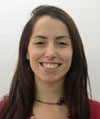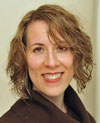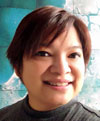| |
|
|

|
|
ATLAS |
|
|
Assistive
Technology
Laboratory
at
Stanford |
|
|
|
Technology and
design benefitting individuals with disabilities and older adults in the local
community |
January 24, 2014 |
|
|
|

Welcome to this edition of Perspectives,
the e-newsletter of the
Stanford course,
Perspectives in Assistive
Technology.
This issue invites you
to attend the next class session and
encourages your participation in the
course's assistive technology
faire.
What is
the course? - Perspectives in Assistive Technology is a
Winter Quarter course at Stanford that explores the design, development, and
use of assistive technology benefitting people with disabilities and older
adults. Much more information can be found on the course website. Student enrollment in the course seems
to have stabilized at 49.
Invitation to attend - You are invited to attend
all class lectures. They will be held in the
Thornton Center - Classroom 110 on Tuesday
and Thursday afternoons at 4:15 to 5:30pm and are free and open to the
public.
Next class session - Tuesday, January 28th at
4:15pm:
|
  
|
International
Perspectives
Gilat Juli Bachar1,
Kristina Pappas, BA MBA2, and Proadpran P. Punyabukkana,
PhD3
1 Haas
Center Graduate Public Service Fellow, 2 Benetech - International
Program Manager, Global Literacy, 3 Assistant Professor, Department
of Computer Engineering, Faculty of Engineering, Chulalongkorn University,
Bangkok, Thailand |
|
Rights of Persons with Disabilities
in Israel: Advancements and Hurdles
Gilat Juli Bachar |
|
Abstract: In recent
years the stream of legislation and case law in Israel which respond to
initiatives by persons with disabilities, give legal validation to their
rights, and create mechanisms to advance their integration into society, had
been gradually increasing. One of the highlights of this process had been
Israel's Equal Rights for Persons with Disabilities Law (of 1998), which
constitutes a crucial milestone in the formal, legal acknowledgment of the
rights of persons with disabilities by Israel's legal system. This Law is part
of at least three decades long struggle to stimulate public awareness of
persons with disabilities' rights to accessibility and equality. Yet, despite
this and additional positive steps, other rights of persons with disabilities,
such as the rights to health and housing, do not gain the same level of
recognition by the legal system. |
|
In my presentation, I will
briefly describe the process of formation, conceptualization, and
acknowledgment of the rights of persons with disabilities in Israel. I will
then show how despite these advancements, the legal status of persons with
disabilities in Israel is still quite unsound, most notably with regard to
their social rights (as opposed to civil rights). Finally, I will try to
suggest some potential explanations to this gap based on public perception of
disability. |
|
Biosketch: Gilat
Bachar, from Israel, is a JSD candidate at Stanford Law School,
specializing in international conflict resolution. She holds an LLB, summa cum
laude, and an MBA in Business Administration, summa cum laude, from the Hebrew
University of Jerusalem, which she earned as part of an Interdisciplinary
Honors Program. Gilat earned her JSM in international legal studies from
Stanford in 2013. Her research focuses on the role of civil litigation
initiated by Palestinians against the State of Israel in national courts within
the Israeli-Palestinian conflict. |
|
During her studies, Gilat
worked as a research and teaching assistant in constitutional law and
international conflict resolution and as a pre-intern at the State Attorney
Office, and was a member of the editorial board of Mishpatim, Hebrew
University’s law review. Upon graduation, she became a law clerk with
Chief Justice Dorit Beinisch of the Israeli Supreme Court. Later, she joined a
firm in Israel, where she specialized in dispute resolution. She combined her
practical legal work with a teaching assistant position at the Herzliya
Interdisciplinary Center. Gilat is also a fellow at the Stanford Center on
International Conflict and Negotiation. |
|
Bookshare International: Making
Reading Accessible to All
Kristina Pappas, BA, MBA |
|
Abstract:
Benetech’s mission is to harness the power of technology to address unmet
social needs. Within its Global Literacy Program, this mission translates into
developing affordable technology to help the multitudes of people who remain
underserved by the commercial technology field around literacy. Bookshare, the
Global Literacy Program’s flagship initiative, is the world’s largest
online library of digital books that are accessible to people with print
disabilities. Bookshare currently serves over a quarter million students in the
US and offers over 220,000 titles (with thousands more added every month).
There are significant structural and legal challenges to serving international
users, but there are also exciting changes underway, including more widespread
availability of technology and the 2013 passage of the Marrakesh Treaty to
Facilitate Access to Published Works for Persons Who Are Blind, Visually
Impaired, or Otherwise Print Disabled. |
|
Biosketch: Kristina
Pappas is the Global Literacy Program Manager at Benetech and has an
extensive background in book publishing and international business. Ms. Pappas
brings her strong passion for harnessing the power of business to solve social
problems to the day-to-day management and operation of Bookshare International.
She believes strongly that technology can allow people to participate fully in
work and life, regardless of disability, economic status, or location. Ms.
Pappas holds a BA in Comparative Literature from Stanford University and an MBA
in Sustainability from Presidio Graduate School. |
|
Under her direction,
Bookshare International has grown to encompass members in nearly fifty
different countries, books in nine different languages, and partnerships with
international organizations serving people with print disabilities. Through
these partnerships, Bookshare has implemented programs to increase
international membership by addressing the unique technology and infrastructure
challenges that exist in many countries. |
|
Assistive Technology: When East
Meets West
Proadpran P. Punyabukkana, PhD |
|
Abstract: Economic
situation, technological availability, and basic needs differ from one country
to another. To build the right Assistive Technology solutions, it is important
to listen to people with disabilities in the local community. In this talk, I
will share various computer-centric projects by students and professionals in
Thailand during the past three years. They range from non-visual games to
haptic devices. Emphasis will be given to the on-going major project to produce
e-books semi-automatically. Finally, I will compare and contrast my experience
between courses and projects in Thailand and those at MIT, where I am currently
a visiting scholar. |
|
Biosketch:
Proadpran Punyabukkana is an Assistant Professor at Chulalongkorn
University in Bangkok, Thailand. She joined the University in 1993 prior to
being awarded a Fulbright Scholarship to pursue her PhD at Claremont Graduate
University in 2003. Her doctoral thesis was in the area of programming,
specifically Object-Oriented language design and implementation. When she
returned to Thailand, she shifted her interest to the field of Speech
Technology, focusing on speech synthesis and speech recognition in Thai. She
and a colleague formed the Spoken Language System Research Group in
2004. Their applications have been put to use for people with disabilities.
While exploring the situation in Thailand, they started the Assistive
Technology Research Group in 2006. To date, the two groups have graduated
more than 70 undergraduate and graduate students. |
|
Proadpran served as Assistant
Dean of Engineering at Chulalongkorn University from 2004 to 2008 and Associate
Dean from 2008 to 2013. She is currently on sabbatical leave under a Fulbright
Visiting Scholar grant as a visiting professor first at MIT and now at
Stanford. |
|
Would you like to participate in the assistive technology
faire? - This repeat event -
scheduled for Tuesday, February 11th - will provide an opportunity for
students and community members to get an up-close look at a variety of devices
and learn about available services. If you are a vendor of assistive technology
products or supply assistive technology services and would like to participate,
please contact me. Everyone is welcome to attend the faire. |
Would you
like to support the course? - Funding in any amount for the course
and student projects is always welcomed. Monetary gifts support approved
project expenses, administrative costs, honoraria for guest lecturers, and the
end-of-term celebration. Refer to the Team Project
Support webpage for more information.
Please contact me if you have any
questions, comments, or suggestions about the course and thank you again for
your interest.
Dave

Do you
have a question or comment? - David L. Jaffe, MS, the course
instructor, can be reached by email
or at 650/892-4464.
To unsubscribe from this
newsletter, please email Dave. |






